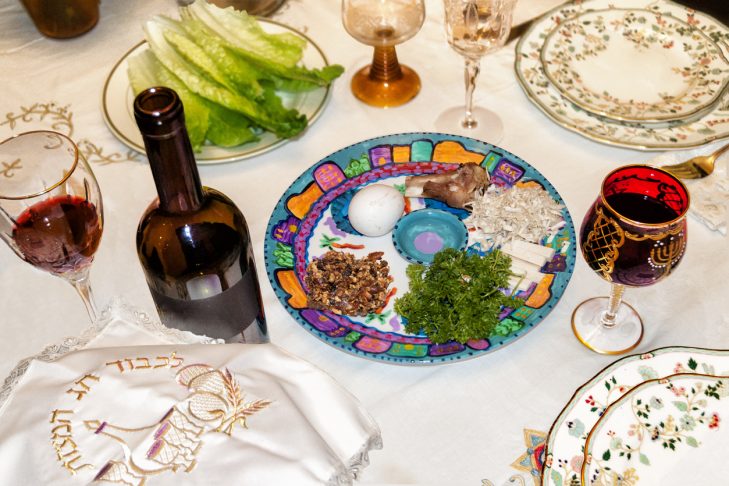Last year at this time American Jews were wondering just how much politics to bring (or not bring) to the seder table. This year, some among us feel there’s nothing more to discuss. Others are looking to our traditional story of oppression, wondering whether now is the moment to draw parallels.
Of course, there’s not one answer. Since it’s Passover, there should probably be at least four. As you think about the Exodus from Egypt, with memories of matzah brei gone by, here are four ways to approach this question. You may or may not want to address issues head on, but context and style matter. Hopefully, these will help.
- Revisit your Haggadah. No, the story hasn’t changed since last year, but there’s a good chance you have. Do you need something tried and true, like the four cups of coffee of the Maxwell House Haggadah? Maybe you need to blend old and new, adding conversation points that speak to today to the familiar melodies of yesterday. Or perhaps you need to brush away ancient crumbs and start with a new Haggadah altogether.
If you’re looking for ideas, check out the Religious Action Center of Reform Judaism (the RAC), which has a variety of socially conscious Haggadah texts. Want something completely new? The Politics and Prose Bookstore in Washington, D.C., has a bibliography of options, as well as some guidelines for how to make your choice. Of note: Our Haggadah, by Cokie and Steve Roberts, which navigates sharing the holiday with a multifaith family, and The Journey Continues, from the Jewish Women’s Project, a text that raises up the voices of women and takes an intersectional approach to racial and economic justice.
- Bring the story to life. Stage your den as a desert tent and hold the seder there, using it as a metaphor for placelessness. Or take time during the seder to tell family origin stories, highlighting Passover celebrations that took place long ago and far away. One midrash (commentary) says that the Israelites were redeemed because they kept their names, their language and their dress. Tell the stories of your own names, see how many languages you can produce for at least the first line of the Four Questions, talk about contemporary identity politics around what we wear. Don’t fill Elijah’s cup at the start of the seder. When the time comes to greet him, have each person at the table pour in some wine from their own glasses, also sharing how they will participate in bringing redemption to the world in the year ahead.
At a table of talkers? Incorporate a “symposium,” an in-depth conversation about one theme from the holiday. A Different Night: The Family Participation Haggadah gives ideas and texts for those deeper conversations. If you’re concerned that adding in some innovation dilutes the ritual, don’t be. The Passover seder is all about questions. It’s even modeled on the Greco-Roman style of a leisurely banquet more about food for the mind than food for the belly.
- Take it to the streets. Passover is an eight-day holiday. Seders are only part of the first or first two nights. The message of the redemption from slavery calls us to action, not just words. At the seder we say, “In every generation a person must see themselves as if they personally departed from Egypt.” What steps can we take to free another from their metaphoric Egypt? We need to remember that eating matzah is necessary, but insufficient.
T’ruah: The Rabbinic Call to Human Rights has both seder supplements and action items. Same goes for HIAS (Hebrew Immigrant Aid Society). Or start at home, by looking at the needs of your local community and figuring out what role you can play in making it a better place.
- Take a break. This one is the hardest for me to say and will probably be even harder to do. The intensity of the world right now is exhausting. Maybe call a moratorium on political discourse at your seder. Maybe in the spirit of sweeping away the crumbs, you take a break from social media. Maybe focus your attention on what is good and bright and shiny in the world. The challenges will wait for you to return. And maybe, for having nurtured yourself with time to catch your breath, you’ll feel more like you are up to the task.
May your Passover be exceedingly sweet and equally liberating.
This post has been contributed by a third party. The opinions, facts and any media content are presented solely by the author, and JewishBoston assumes no responsibility for them. Want to add your voice to the conversation? Publish your own post here. MORE



